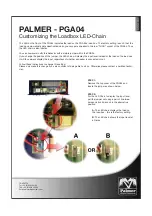
Parallel gripper HGPD
Festo SE
&
Co.
KG
Postfach
D-73726 Esslingen
++49/711/347-0
www.festo.com
Operating instructions
756833
1102NH
Original: de
Parallel gripper HGPD
English
. . . . . . . . . . . . . . . . . . . . . . . . . . . . . . . . . . . . . . . . . .
Warning
During commissioning and operation:
Moving masses can cause injury to people (danger of crushing) or damage to
property.
• Use a protective screen to make sure that:
– no one can place their hands between the gripper fingers,
– there are no objects in the gripping area (e.g. by means of a protective guard)
When exhausting (without gripping force backup):
• Make sure that the gripper is not holding a working load.
In this way you can prevent a working load from falling down suddenly.
When dismounting the piston cap:
High spring forces cause the piston cap on the HGPD-…-G… to fly outward
(danger of injury,
Fig. 10).
• Please ensure that the piston cap is preloaded to 1400 N.
Note
Installation and commissioning is to be carried out only by qualified personnel in
accordance with the operating instructions.
1
2
3
4
7
6
8
5
Fig. 1: Control sections and connections
1
Function and application
When the compressed air connections
5
and
6
(or alternative connections
1
)
are pressurised alternately, an internal piston is moved backwards and forwards.
A mechanism transfers the movement of the piston to the gripper jaws
7
, to
which gripper fingers are fastened.
The opening and closing action of the gripper fingers enables them to grasp work-
ing loads by their outer or inner contour (double-acting). In conjunction with the
integrated reset spring, the HGPD-…-G… can also be operated in single-acting
mode and for locking the gripping force. If the gripper is exhausted, this spring
returns the gripper jaws and pistons to their initial positions:
– Gripper finger open
on HGPD-…-G1
– Gripper finger closed
on HGPD-…-G2.
The parallel gripper HGPD-… is intended for gripping and holding work loads.
2
Requirements for product use
• Compare the maximum values specified in these operating instructions with
your actual application (e.g. pressures, forces, torques, temperatures, masses,
speeds). Only observance of the load limits allows operation of the product in
compliance with the relevant safety regulations.
• Take into consideration the ambient conditions at the location of use.
Corrosive elements in the environment (e.g. ozone) will reduce the service life of
the product.
• Ensure that the compressed air is properly prepared (
11 Technical Data).
• Maintain the selected medium for the complete service life of the product. Ex-
ample: Always use non-lubricated compressed air.
• Pressurise your entire system slowly. This ensures that there will not be any
uncontrolled movements. For slow start-up pressurisation, use on-off valve HEL.
• Comply with the regulations of the German Technical Control Board (TÜV), trade
association or relevant national regulations.
• Remove all transport packaging such as foils, caps and cartons (except for any
plugs in the pneumatic connections).
It is intended that the packaging be recycled on the basis of its constituent ma-
terials (exception: oiled paper = general waste).
• Use the product in its original state without any unauthorised modifications.
• Note the warnings and instructions on the product and in the relevant operating
instructions.
• Take the tolerance of the tightening torques into account.
Unless otherwise specified, the tolerance is ±20%.
• Take the product's weight into account. It weights up to 7.5 kg.
3
Mechanical installation
Note
Excessive tightening torques during
fitting will damage the gripper
mechanism.
• Make sure that the maximum per-
missible tightening torques are not
exceeded.
• Observe the maximum permitted
values for the following characteri-
stics (
11 Technical Data):
– Force Fz
– Torques Mx, My and Mz
Fig. 2
Fitting the gripper fingers
1. Position the gripper fingers with the
centring sleeves on the fitting hole
9
of the gripper jaw.
2. Fasten the gripper fingers with two
fastening screws
aJ
each to the
threaded holes.
Please refer to the following table for
the variable values.
9
aJ
Fig. 3
Size
16
20
25
35
40
50
63
80
Fitting hole
∅
cylindrical dowel
pin [H8]
[mm]
2
–
Fitting hole
∅
centring sleeve
[H8]
9
[mm]
–
5
7
9
9
12
12
15
Screw
aJ
M2.5 M3
M4
M6
M6
M6
M8
M10
Tightening torque
aJ
[Nm]
0.8
1.2
3
10
10
10
24
47
Fig. 4
If proximity sensors are used:
• Please check the following points:
– Interference caused by ferritic mounting parts (e.g. by mounting screws made
of ferritic steel)
– Possibly protruding proximity sensors.
When sensing both piston end positions:
• Push the proximity switches into separate grooves
3
.
• Make sure there is sufficient room for the connection elements.
Fitting the gripper:
• Fasten the HGPD as follows:
1. Press two centring pins or centring
sleeve
aB
into the fitting holes.
2. Place the gripper on the connecting
surface.
3. Fasten with the screws
aA
/
aC
.
Please refer to the following table for
the characteristics:
aA
aC
aB
Fig. 5






















